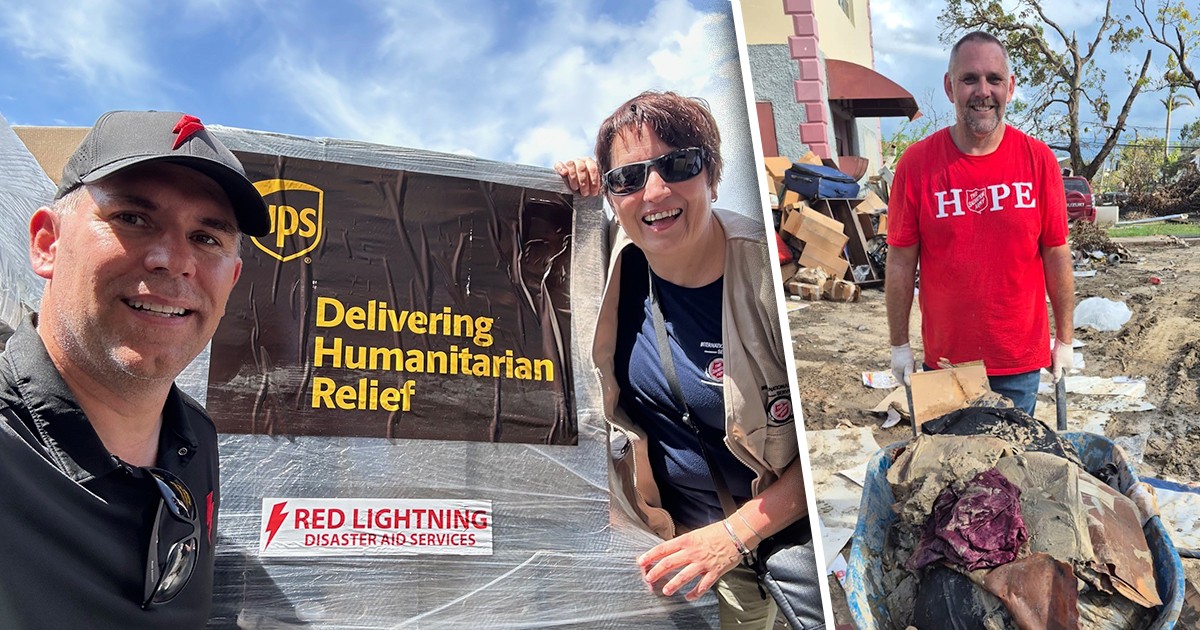As of April 8:
As the situation becomes clearer after the April 1 earthquake and tsunami that struck northern Chile, The Salvation Army is stepping up its relief operation. A state of emergency in the region, which was put in place by the government within hours of the initial quake, is still in operation and – according to a government official – will remain so for "as long as is necessary."
The Salvation Army's South America West Territory has relief teams in place in the affected area, providing assistance to people who have lost homes and livelihoods. Plans are in place to send approximately 20 tonnes of tents, blankets, mattresses and food for distribution. This response is being funded by a US$50,000 donation from the USA Southern Territory.
Emergency canteens (mobile kitchens) are being prepared to send into the worst-hit areas, although many are still difficult to reach because of damage to roads. The territory is also looking at the possibility of working with communities to build basic wooden houses for people who have lost homes and belongings.
In the community of Alto Hospicio, around 2,000 houses were destroyed and 30 fishing boats were washed away, leaving fishermen with no means of earning a living. Salvation Army team members have also managed to make it through to Camarones and Huara to check on needs and damage and to help people wherever possible.
As of April 4:
The Salvation Army in Chile is providing much-needed assistance to people affected by the earthquake and subsequent tsunami that hit coastal regions in the north of the country on the evening of April 1. More than 2,600 houses were destroyed and many thousands of people were evacuated from their homes when tsunami alarms sounded. Eight people are known to have been killed in the disaster, but the swift evacuation enabled most people to reach safety.
Salvation Army leaders in Chile report that the worst-hit area appears to be around Alto Hospicio, in Iquique Region. The main road is blocked due to holes and mudslides, making it very difficult to reach the community. Salvation Army teams are working with the local authorities to find the best way to reach Alto Hospicio in order to provide assistance. Reports say that many families have lost their homes and are sleeping in the streets. The area currently has no water or electricity supplies.
Support will also be needed by fishermen, many of whom have lost their boats, leaving them without a means of earning an income.
Officers and soldiers from corps in the town of Calama and from the Chile North District office are working in three teams, distributing water, milk, coffee and basic food supplies. The soldiers and officers of Iquique Corps are providing soup at night. Power is a particular problem, so the teams are sourcing generators.
Lieut-Colonel Alex Nesterenko (Chief Secretary for The Salvation Army's South America West Territory) adds: "Besides physical support the officers, soldiers and volunteers are already giving spiritual support as needed."
As the situation becomes clearer after the April 1 earthquake and tsunami that struck northern Chile, The Salvation Army is stepping up its relief operation. A state of emergency in the region, which was put in place by the government within hours of the initial quake, is still in operation and – according to a government official – will remain so for "as long as is necessary."
The Salvation Army's South America West Territory has relief teams in place in the affected area, providing assistance to people who have lost homes and livelihoods. Plans are in place to send approximately 20 tonnes of tents, blankets, mattresses and food for distribution. This response is being funded by a US$50,000 donation from the USA Southern Territory.
Emergency canteens (mobile kitchens) are being prepared to send into the worst-hit areas, although many are still difficult to reach because of damage to roads. The territory is also looking at the possibility of working with communities to build basic wooden houses for people who have lost homes and belongings.
In the community of Alto Hospicio, around 2,000 houses were destroyed and 30 fishing boats were washed away, leaving fishermen with no means of earning a living. Salvation Army team members have also managed to make it through to Camarones and Huara to check on needs and damage and to help people wherever possible.
As of April 4:
The Salvation Army in Chile is providing much-needed assistance to people affected by the earthquake and subsequent tsunami that hit coastal regions in the north of the country on the evening of April 1. More than 2,600 houses were destroyed and many thousands of people were evacuated from their homes when tsunami alarms sounded. Eight people are known to have been killed in the disaster, but the swift evacuation enabled most people to reach safety.
Salvation Army leaders in Chile report that the worst-hit area appears to be around Alto Hospicio, in Iquique Region. The main road is blocked due to holes and mudslides, making it very difficult to reach the community. Salvation Army teams are working with the local authorities to find the best way to reach Alto Hospicio in order to provide assistance. Reports say that many families have lost their homes and are sleeping in the streets. The area currently has no water or electricity supplies.
Support will also be needed by fishermen, many of whom have lost their boats, leaving them without a means of earning an income.
Officers and soldiers from corps in the town of Calama and from the Chile North District office are working in three teams, distributing water, milk, coffee and basic food supplies. The soldiers and officers of Iquique Corps are providing soup at night. Power is a particular problem, so the teams are sourcing generators.
Lieut-Colonel Alex Nesterenko (Chief Secretary for The Salvation Army's South America West Territory) adds: "Besides physical support the officers, soldiers and volunteers are already giving spiritual support as needed."









Leave a Comment